Acknowledgement
Acknowledgment is a crucial step in fostering the healthy unfolding of grief. Acknowledgment of the importance of the person who died, the importance of his or her death, and the irrevocable change that has taken place are necessary for mourning to proceed. To act as though we are unaffected or to believe we should not be affected by the death of someone important to us leaves us unable to go forward with the purging of our pain, coming to grips with all the ramifications of the significant change that has taken place, redefining ourselves without the person we have lost, and making the necessary adjustments to our new life without him or her.
Traditional religious and cultural mourning rituals have historically served the function of acknowledging the significance of death and validating the legitimacy of the grief response. Sharing a like religious or cultural mind set, and having mourning rituals dictated, relieves the bereaved and the community in grief of the task of demonstrating the importance of the deceased. There is no need to justify the pain of grief. A community mourning together helps to soothe the pain while at the same time confronting the issues of powerlessness, helplessness, mortality, and finality in the face of death.
Powerless in relation to the finality of death, helpless in relation to the loss, and fearful from the confrontation with mortality, people realized that honoring the importance and meaningfulness of the deceased and the life we lived with them eased the grief. Validating the experience of grief through publicly shared mourning aids the bereaved in staying connected to their family and community in a meaningful way. Sadly, many traditional mourning rituals have become hollow exercises in modern society. For many, despite the original intent, the rituals offer little solace or reconnection to a community.
Hollow rituals do not substantiate the importance and meaningfulness of the deceased, and the mourning path is not illuminated. The method and support for purging our pain, incorporating this profound human experience into an ongoing and expanding redefinition of self, and making the necessary adjustments to our new life without the one who died is lost.
Finding ways to acknowledge the importance of the deceased and his/her death and validate your grief response can be a burden during a time of bereavement. Alternately, it can also be an opportunity for creative mourning activities and rituals that truly honor the individual who has died, your unique personal relationship with them, and the specific meaning to you of the life shared and now lost.
I recommend that you utilize and share personal or traditional rituals and activities to acknowledge the importance of your connection to others, the severing of these connections, the experience of loss, and the validity of grief.
